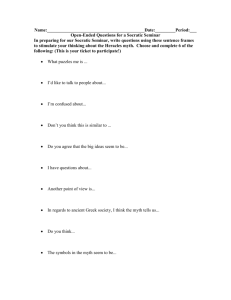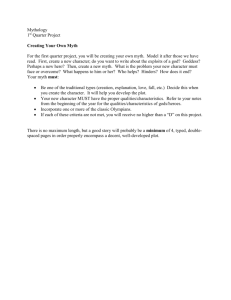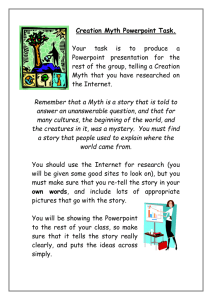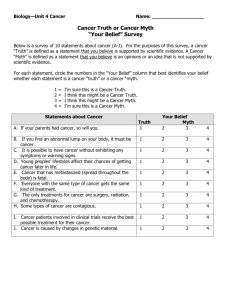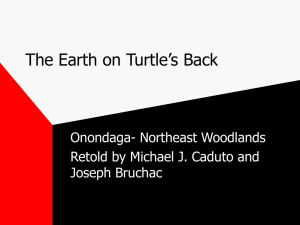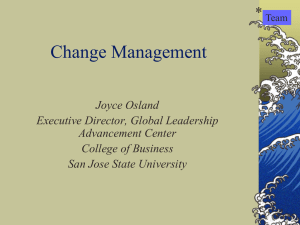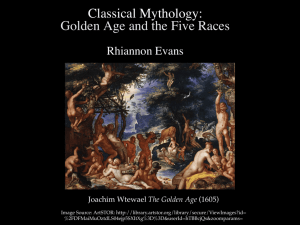Comparative Literature Syllabus and Class
advertisement
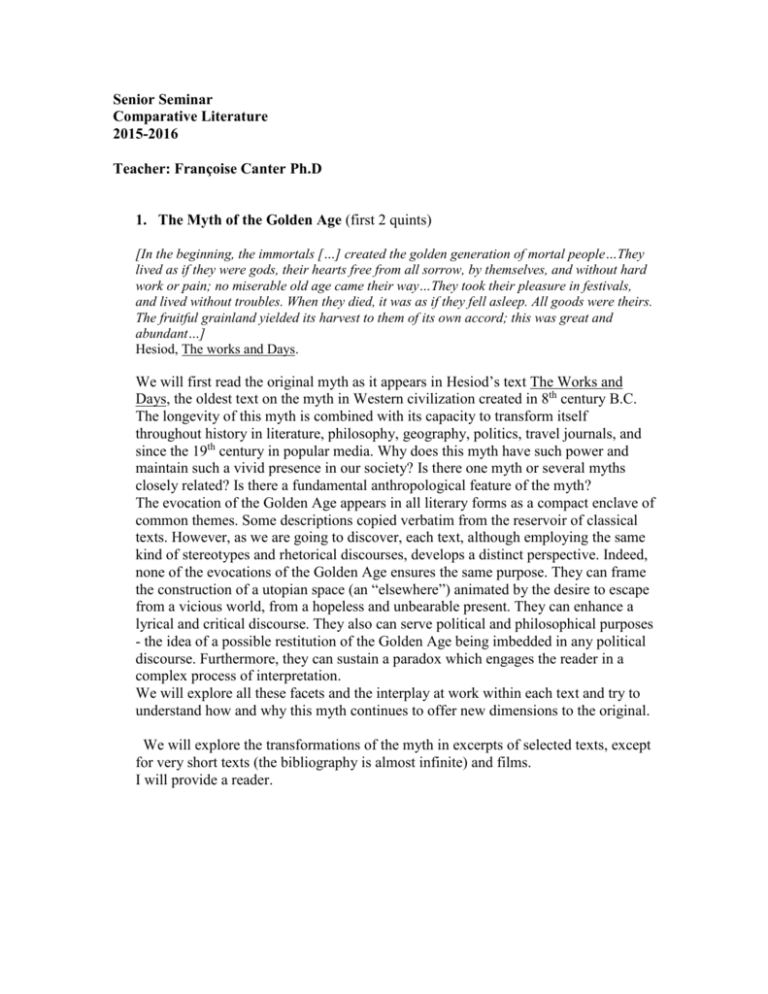
Senior Seminar Comparative Literature 2015-2016 Teacher: Françoise Canter Ph.D 1. The Myth of the Golden Age (first 2 quints) [In the beginning, the immortals […] created the golden generation of mortal people…They lived as if they were gods, their hearts free from all sorrow, by themselves, and without hard work or pain; no miserable old age came their way…They took their pleasure in festivals, and lived without troubles. When they died, it was as if they fell asleep. All goods were theirs. The fruitful grainland yielded its harvest to them of its own accord; this was great and abundant…] Hesiod, The works and Days. We will first read the original myth as it appears in Hesiod’s text The Works and Days, the oldest text on the myth in Western civilization created in 8th century B.C. The longevity of this myth is combined with its capacity to transform itself throughout history in literature, philosophy, geography, politics, travel journals, and since the 19th century in popular media. Why does this myth have such power and maintain such a vivid presence in our society? Is there one myth or several myths closely related? Is there a fundamental anthropological feature of the myth? The evocation of the Golden Age appears in all literary forms as a compact enclave of common themes. Some descriptions copied verbatim from the reservoir of classical texts. However, as we are going to discover, each text, although employing the same kind of stereotypes and rhetorical discourses, develops a distinct perspective. Indeed, none of the evocations of the Golden Age ensures the same purpose. They can frame the construction of a utopian space (an “elsewhere”) animated by the desire to escape from a vicious world, from a hopeless and unbearable present. They can enhance a lyrical and critical discourse. They also can serve political and philosophical purposes - the idea of a possible restitution of the Golden Age being imbedded in any political discourse. Furthermore, they can sustain a paradox which engages the reader in a complex process of interpretation. We will explore all these facets and the interplay at work within each text and try to understand how and why this myth continues to offer new dimensions to the original. We will explore the transformations of the myth in excerpts of selected texts, except for very short texts (the bibliography is almost infinite) and films. I will provide a reader. 2. Narrative of Expatriates and Exiles: Splitting and Shaping Identity (last three quints) “The expatriate discovers consciously (and sometimes painfully) a certain number of realities that build, most of the time unbeknownst to us, the human condition”. Nancy Huston, North Lost, Actes Sud, 1999 (my translation). This topic, related to cultural displacement or exile, is close to my own history and heart. I started to realize and experience several years ago in my everyday life that I did not feel French anymore, that some of my memories were simply dead (because in order to keep a memory alive you need to nourish it, to talk about it, to share it). I noticed that my attitude and reactions to my children in France were different from the ones my French friends had. I remarked that everything in Paris was familiar to me but was not part of myself anymore and that I was absent from there. I also perceived that some of my values had changed as well as my use of the language. However, I realized simultaneously that I will never be an American because my soul and my body have been raised French, because my childhood will always be within me. This experience was profound and enlightening. In this Seminar we will explore, through the narrative of expatriates (first and second generations) and exiles, the rich interplay that shape the feeling of being separated from one’s self and correlatively the constant building and aggregation of the self. This year, we are going to address more specifically the question of translation and the question of thinking between languages. What is translation? How to translate? Why translation matters? Quint 5 will be most entirely devoted to a creative work in translation. I will provide a reader. THE NORTHWEST SCHOOL Senior Seminar Comparative Literature 2015-2016 Teacher: Françoise Canter Class description: since this class is a seminar your presence and active participation are central to the success of the year. The class time will be mainly devoted to the discussion of the assigned reading and each of you in turn will be responsible for leading the discussion. We will occasionally do close reading of important or difficult passages in class. You will be required to write regularly short answers to assigned texts as well as longer analytical and comparative essays. You will also be able to explore creative writing as an answer to a text or as a pastiche of a text. - You need to make the commitment to attend each and every session on time. After 2 absences, each absence lowers the participation component of the grade by 1/3. If you are absent it is your responsibility to contact me to find out what you missed and what you need to do for the next class. - All work must be completed and submitted on time. - The grade will then be based on all these components: Participation, weekly assignments, essays, oral report, and group work.

